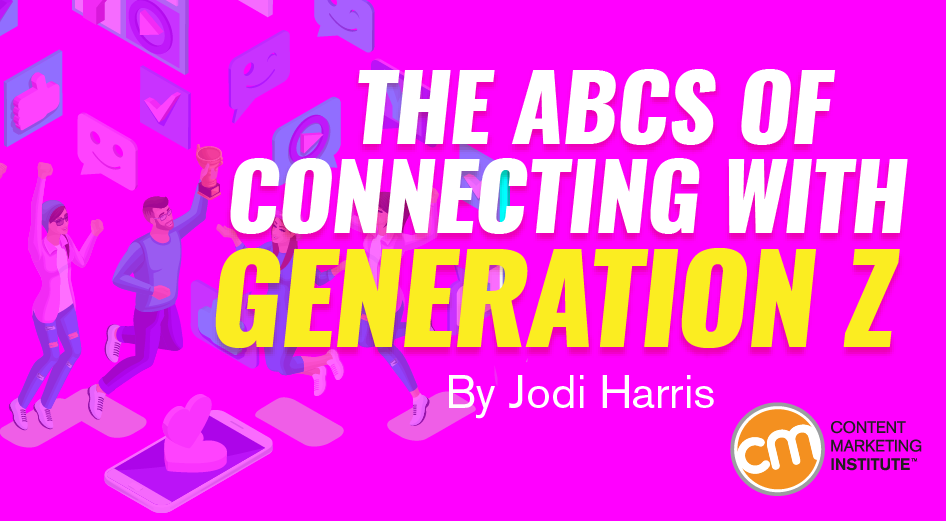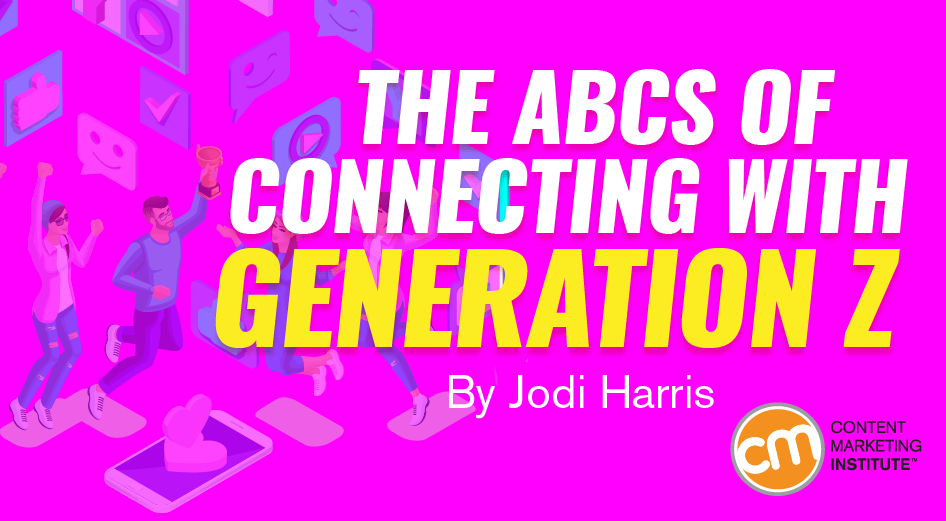Now that’s the power of persuasion. According to Barkley’s Gen Z Insights Center, Gen Z already has up to $143 billion in direct buying power with the potential to impact more than $665 billion in family spending. Furthermore, this group is projected to make up 40% of consumers by 2020. What to expect when you’re connecting In his recent Content Marketing World presentation on the subject of Generation Z, FutureCast President Jeff Fromm characterized this demographic group as “old souls in young bodies.” While they are digital, social, and mobile to the core, he says, their values are more strongly aligned with their baby boomer counterparts than those of the generation that came directly before them (millennials). Jeff explains more about Gen Z in this video from our Mastering Content Marketing series: A 2017 Salesforce report, Trends in Customer Trust, supports this assumption, finding that among millennials and Gen Z 91% are more likely to trust companies with their personal information if they receive a clear explanation on how its use will deliver a better experience. Take its YouTube channel, for example. Read: Marketing Lifehacks for Engaging Generation Z Consider: According to cultural mythologist John Bucher, those in Gen Z likely gravitate toward these blended experiences because they allow them to experience something that’s hard to come by in their world: a chance to live in the “now.” In his presentation on immersive storytelling at Content Marketing World, John asserted that the pressures of today’s tech-driven, always-on lifestyles have disrupted the natural sense of time and place. According to the aforementioned Trends in Trust data, 54% of consumers say demonstrated social responsibility strengthens their trust in a company. For example, through its Today at Apple program, the ubiquitous tech brand offers in-depth technical training sessions at its 495 retail stores. Read: Education as a Marketing Strategy: 8 Brands Doing Online Classes and More Content conclusion One thing about Gen Z – or any other generation – is that the best way to learn who they are and what content experiences they want brands to provide is to spend some time engaging with them on a personal level.

It’s time to put away your avocado toast jokes and shore up your social consciousness, folks. Generation Z consumers have arrived, and they are forcing companies to rethink the terms of marketing relationships.
Born between 1995 and 2012 (though the precise years vary depending on the source), the post-millennial generation has begun to cross the threshold of adulthood and is poised to take over the workforce and the marketplace in the next few years. We’ve all heard the stories about how challenging it will be to forge strong bonds with this distracted and discerning demographic; industry pundits cite perceived short attention spans, disinterest in brand messaging, and general disregard for impersonal experiences as compelling reasons for marketers to regroup and refine their content strategies.
But how many of these broad characterizations are accurate – and which of this generation’s confirmed traits should content marketers focus on in their outreach efforts? Let’s take a look.
It’s their party (and they’ll buy if they want to)
Here’s what the generational research and anecdotal observations are telling us: Born with one foot firmly in the digital age and the other rooted in old-school values, members of this pivotal demographic group expect greater transparency, accountability, and personal validation from every online experience they choose to engage in.
Why? Well, it should come as no surprise that a demographic colloquially called the “iGeneration” expects to see their personal needs and interests reflected in the experiences marketers create to engage them.
Further, if their high usage of social networks like Instagram, YouTube, and Twitch are any indication, social status and community mean a lot to them; they are more likely to seek content opportunities endorsed by their idols and influential peers (or which enable some form of collaboration with them). Need proof? Just 24 hours after Taylor Swift urged her 112 million-strong Instagram fan base to vote for Democrats in the mid-term elections, nonpartisan voter advocacy group Vote.org registered a whopping 65,000 new voters. Now that’s the power of persuasion.
Of course, the right branded content can still make it onto their radar; any extra effort it may take to produce and position such experiences is worth it, considering how much economic power this audience segment wields in the marketplace. According to Barkley’s Gen Z Insights Center, Gen Z already has up to $143 billion in direct buying power with the potential to impact more than $665 billion in family spending. Furthermore, this group is projected to make up 40% of consumers by 2020.
What will make a content experience more likely to click with these smart, savvy, and socially responsible digital natives? Read on for some helpful perspectives and ideas.
What to expect when you’re connecting
In his recent Content Marketing World presentation on the subject of Generation Z, FutureCast President Jeff Fromm characterized this demographic group as “old souls in young bodies.” While they are digital, social, and mobile to the core, he says, their values are more strongly aligned with their baby boomer counterparts than those of the generation that came directly before them (millennials).
For example, though they don’t remember a time when all the world’s information wasn’t available to them in exchange for a little personal information, they have seen firsthand what can happen when you disclose private data without a thorough understanding of how that data might be used – or misused (Cambridge Analytica and the Equifax data breach are two examples that come to mind). As a result, they may be more reluctant to swap personal details for access to brand content unless your brand provides full transparency on what they are signing up for and what the risks and benefits are.
Jeff explains more about Gen Z in this video from our Mastering Content Marketing series:
A 2017 Salesforce report, Trends in Customer Trust, supports this assumption, finding that among millennials and Gen Z 91% are more likely to trust companies with their personal information if they receive a clear explanation on how its use will deliver a better experience.
Consider: Marketers should cultivate a reputation of reliability they can trade on before expecting Gen Z to engage with and take action on content – a goal that Robert Rose has succinctly summarized: “You must win every moment of trust to win the moment of truth.”
Trust exists on a time clock
In his CMWorld presentation, however, Jeff, the man who wrote the book on marketing to Gen Z (literally) reminded marketers that any initial trust earned with this audience may be fickle and fleeting. Calling it “the trust trap,” he contends that brands can’t give lip…

COMMENTS